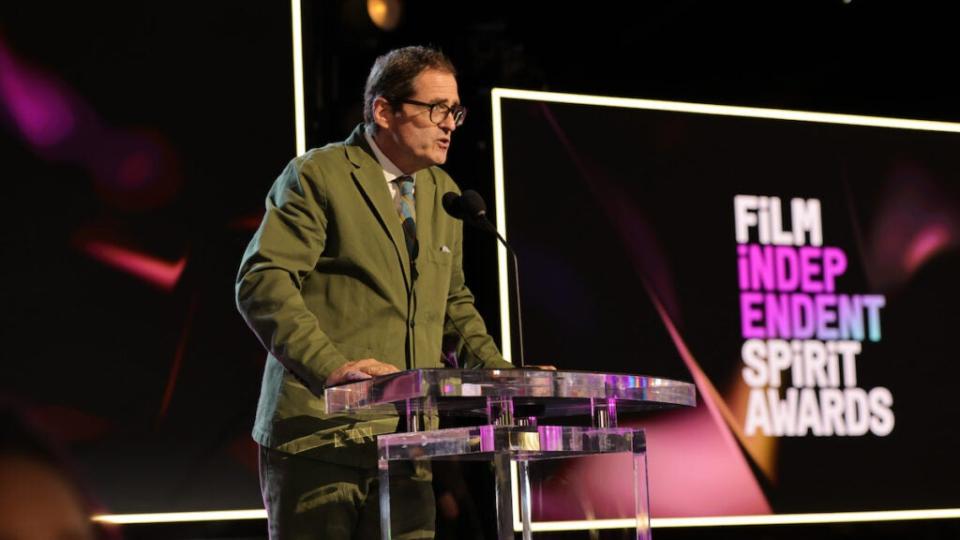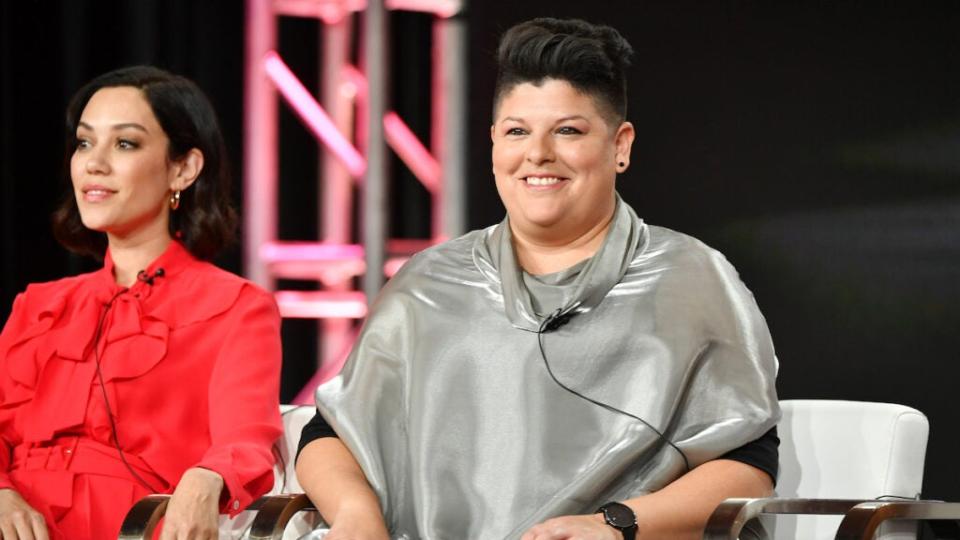Why Awards Shows Are Embracing Gender-Neutral Acting Categories – and Will the Oscars Follow?
The conversation has been ongoing for years, but only within the last few months have several awards bodies finally stepped up to make their acting categories gender neutral, abolishing decades of binary male-female views of acting and opening a door to performers who identify as nonbinary or trans and have felt invisible across the industry.
In August, the Film Independent Spirit Awards became one the most high-profile awards groups to join the trend, ditching separate Best Actor and Best Actress categories and combining them into one field populated with 10 actors. The move follows similar steps by the Gotham Awards in 2021 and the Canadian Screen Awards also in August. The TCA Awards kicked off the movement back as 1996, followed by the Grammys in 2012 (which eliminated gendered categories for performers), followed in recent years by the MTV Movie and TV Awards and the Berlin Film Festival.
For many, the question has simply been: “What’s taken so long?” As Ser Anzoategui, a nonbinary and transgender actor known for their work in the Starz series “Vida,” joked to TheWrap: “If you want to compete, I feel like, what are you scared of? That I’m going to beat you?”
More crucially, stripping acting categories of gender requirements gets awards shows in line with the times and presents opportunities for new faces and new audiences at a time when most awards shows desperately need a spark. “Really, there was no good reason to keep doing it. To me the question is not why we would change and move to nongendered awards but why we wouldn’t change,” Josh Welsh, president of Film Independent, told TheWrap about the Spirits’ decision. “It’s really hard to articulate an argument for why acting awards should be gendered when no other award categories are.”

Despite the wave of awards bodies making this move, Welsh said Film Independent discussed the topic internally for years to make sure this latest push for category equity didn’t come at the cost of the progress that’s already been made in terms of gender balance. After all, the last thing anyone wants is a Best Actor category where nine of the nominees are cisgendered white men and the 10th is Cate Blanchett.
“It’s probably why we didn’t make this decision sooner,” he said. “We don’t want to make any change that is going to harm women in the awards space, so we really gave this a lot of thought.”
For some awards shows, the results of making a shift to nongendered categories has been positive in terms of representation. Since the Grammys did an overhaul, eliminating separate awards for categories the Best Female and Male Pop Solo performance, seven of the 11 winners in the Best Pop Solo Performance have been women (though three of those were Adele), and only 14 nominees were men. In the five years since MTV’s Movie Awards have been gender neutral, three men (Chadwick Boseman twice) and two women have won the Best Performance in a Movie prize, and exactly half (13 of 26) of the nominees in that span have been women.
Last year’s newly gender-neutral acting categories at the Gotham Awards even gave female nominees a slight edge. And BAFTA’s Rising Star Award, which has always been gender neutral, has produced three female winners in the last five years — but just 10 of 25 overall nominees.
All these data points are things Women In Film president Kirsten Schaffer will be watching closely moving forward, acknowledging that while the idea of gender-neutral acting categories should be celebrated, equity is still top of mind. “I always champion innovation and looking out of the box and culture’s changing, and then adapting based on that,” Schaffer said. “If we see it negatively impacting women, then we need to readjust.”
Also Read:
BAFTA Changes TV Award Rules to Increase Recognitions for Women and International Programs
There’s no guarantee however that such a change would work the same for all awards shows across the board. In the case of the Indie Spirits, the Best Actor category will include 10 nominees, while a new award for Best Breakthrough Star will be a nongendered list of five names. Although the move to gender-neutral categories was not a data-driven choice, Welsh pointed to Film Independent’s more female-skewing membership and toward the show’s track record for recognizing diverse talent.
But both the nominees for the Spirits and the Gotham Awards are ultimately selected by a committee after going through an initial membership voting round, so those awards bodies are better poised to embrace gender neutrality while avoiding the potential embarrassment of a male-dominated list of nominees. The BAFTAs, which operate with a similar nomination committee, continue to be in conversations on the subject of gender-neutral acting categories, with a representative for the British Academy saying that “we are absolutely giving this a lot of thoughtful and ongoing consideration.”
“This includes ongoing and close consultation with our sector peers and industry including our membership, stakeholders and experts in this field, as well as expanding our use of entry data this year to inform these conversations,” the representative said.
On the other hand, the Oscars go about their voting far differently, tallying votes from individual branches of the Motion Picture Academy in order to determine nominees. Perhaps as a result, conversations about adopting gender-neutral acting categories have remained mostly preliminary, according to one insider.
Academy president Bill Kramer acknowledged as much in a recent media scrum: “We are conducting due diligence on that…but there’s no plan right now to activate that.”
Also Read:
Latino Representation in TV, Film and Media Grew by Only 1% in the Past Decade, Study Shows
Still, the push to rethink acting awards has gained momentum since Anzoategui first called attention to the issue in a 2019 Los Angeles Times op-ed explaining their dilemma when submitting for awards consideration. Emboldened by “Billions” star Asia Kate-Dillon, a nonbinary actor who entered the 2017 Emmy race in the Supporting Actor category, Anzoategui decided to also submit herself in the Supporting Actor category — but said that neither of the gendered awards felt like a fit.
“It’s binary, there’s no room for us. The way they view us has to be what changes,” Anzoategui told TheWrap. “The fact that you put me in [Best] Actress, it’s an erasure. Oh, yeah, we don’t have to try. The problem is, people put the blinders on and they say, ‘I see you how I choose to see you. I choose to see you as a woman’…That is so frustrating.”
For Anzoategui and others, a gender-neutral acting category is not just about being inclusive but breaking down the binary gender norms Hollywood has traditionally used to define people. Removing the categories separating men and women for the industry’s biggest awards could be one step toward dismantling the notion that leading men and women have to look a certain way.
“It’s not about how you see me because how you see me is shaped by Hollywood. How you see me is shaped by your experience and all of these things that were told about me, people who look like me,” Anzoategui said. “We need to see more people that do not fit into these little molds that have been created by the patriarchy.
“I want to stay alive. Can you help my representation so that people like me don’t get killed,” they added. “That’s the crux of it, is the real need to actually change because you’re saving people’s lives. You’re doing something that we all need.”

Anzoategui’s view was shared by Schaffer, who said that her organization is welcoming to nonbinary and trans performers and also includes them on its annual awards season ballot. That will be pertinent this year for performers like Dillon and “The Crown” star Emma Corrin, who came out as nonbinary this past July and is drawing awards talk for their work in the romantic drama “My Policeman.”
“We’re so used to thinking of acting categories in a binary… this helps us to blow that up. We could look at scripts and think, oh could this be a male actor or a nonbinary actor,” Schaffer said. “There’s a ton of opportunity there, which ultimately, if you can break down the binary around awards, it helps us to break down the binary overall.”
In one respect, fixing representation in awards categories does not directly have an impact on changing the industry at large. But Ruby Marchand, the Recording Academy’s chief awards and industry officer, believes the Grammys’ shift to nongendered performer categories in 2012 did in fact make a difference.
“The Academy’s leadership in this area helped open a lot of minds. It helped open a lot of doors,” Marchand said. “It’s part of establishing really fair and equitable outcomes for all music creators. It’s still resonating through the industry.”
Also Read:
Nova Wav on Working With Beyoncé and How They’re Forging a Path for Female Music Producers (Video)
When the Grammys did an overhaul of its categories, it wasn’t just about addressing DEI but part of a larger “philosophical shift” at the Recording Academy and the overall worth of a Grammy award, with the Academy ultimately trimming 109 categories down to just under 80. Marchand explained that the reassessment forced Grammy officials to look at awards from a different lens and ask, “If we’re going to celebrate musical excellence, do we need genders?”
“When we made that leap forward, that paradigm shift, to say excellence is excellence and we do not need to divide that on a gender basis, we actually opened the door at that time for people, no matter how they identify, to feel recognized and to feel that they are welcomed into our awards process,” Marchand said. “That’s something that has blossomed over the years and we’re really very proud that decision was made for all the right reasons. We’ve never doubted it. We’ve always reaffirmed it, and now we have seen over those 10 years how other awards organizations have also considered their footprint in that area.”
While Anzoategui acknowledged there has been real progress since their 2019 op-ed, they predict that the Academy will only make serious changes when the public conversation escalates as it did over the #OscarsSoWhite controversy.
“What is it that stops you? What is the big deal?” Anzoategui said. “The reason … to have a gender-neutral category or to have a nonbinary category is so that you name it, so it’s visible. Sometimes I still don’t see [myself in a category]. We’re still not included. So there is still that deeper dive that has to be done to truly be equitable.”
Also Read:
Reality Dating Shows: What’s Love Got to Do With It? These Days, Not a Lot

